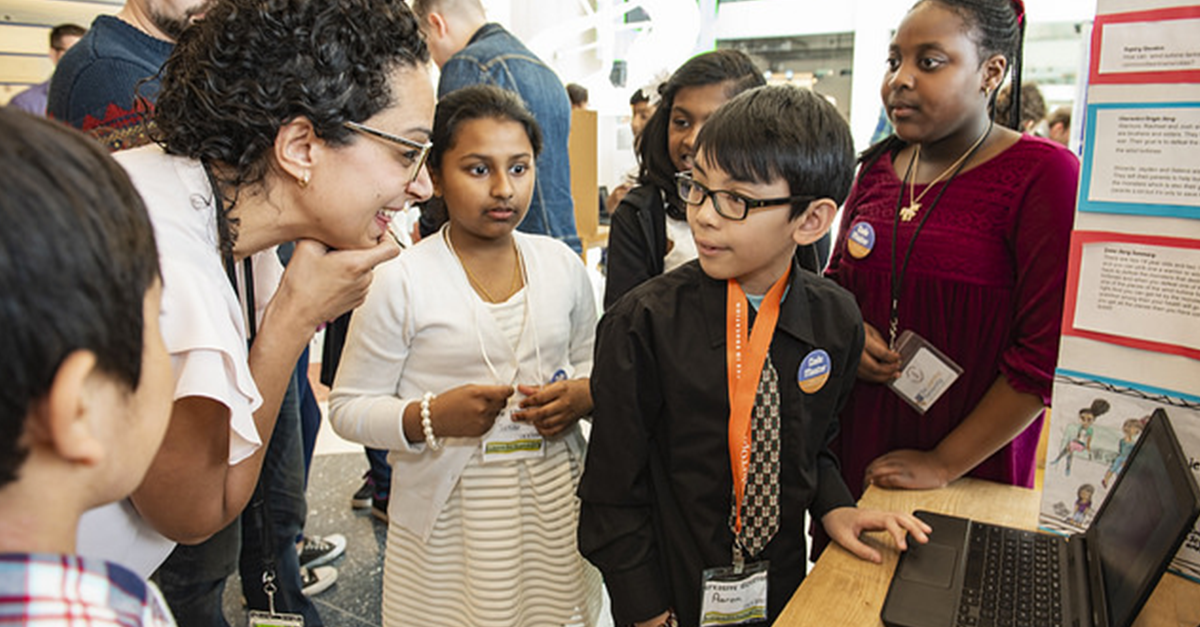As classrooms across Canada embark upon Coding Quest, they may have very different goals, but in some way they’ll tie back to The Learning Partnership’s core mission: to help kids develop the skills they’ll need to be successful in the 21st century.
Founded in 1993, The Learning Partnership is a charity worth highlighting as part of Computer Science Education Week, which officially ran through December 9. Among its many programs -- which help foster entrepreneurial talent as well as social and emotional learning -- Coding Quest is an innovative way to empower teachers and students in grades 4-6 with a grounding in computational thinking. That’s one of the reasons Salesforce.org has made a US$120,000 reinvestment in The Learning Partnership.
Teachers who register as part of Coding Quest receive support through e-learning resources and a half-day training workshop with The Learning Partnership to activate the program in their classrooms. Students learn to code using Scratch, a programming language that came out of MIT. The length of the Coding Quest program can run for as little or as long as teachers in a particular school need. The program culminates in a public showcase, the Arcade, where students present the educational video games they’ve developed, accompanied by a 30-second “elevator pitch” to real-world experts such as game developers or engineers.
Programming Education That Builds Off Curriculum
According to Soriana Mantini, a former school principal who is now The Learning Partnership’s national program manager, Coding Quest helps address a potential gap she noticed in similar initiatives around teaching STEM (science, technology, engineering and math) skills to young people.
“In other programs, students might do a coding challenge but once it is over they might not do anything for the rest of the year. They are left with a ‘Now what?’ feeling. Coding Quest is the answer to ‘Now what,’” she said. “Teachers don’t want something that’s an add-on, or something extra, they want something relevant to their curriculum and their teaching.”
Instead, Coding Quest is versatile enough that it can be adapted to what students are already learning in class, which could mean developing games that relate to topics like the circulatory system, or Canadian history.
Lorena Almaraz, who coordinates Coding Quest at The Learning Partnership, said the program can also tap into those students who might not immediately gravitate to programming. If they are interested in the environment, for instance, they could develop an educational video game that explores climate issues in some way.
“A lot of the tools and innovations for coding are developed by a certain kind of people, for a certain kind of people,” she pointed out. “We want to be able to offer at least the basic skills so anyone can be part of that digital conversation. This is an area that shouldn’t be thought of in a monochrome way -- coding should represent the complexity and diversity of human talent.”
Bridging Business and the Classroom
Coding Quest is being offered at a time when every kind of business and public sector organization imaginable is being transformed by technology. This has led to lots of speculation about “the future of work” and brought waves of startups into industries that were once dominated by a few traditional players. Almaraz said the program helps by not only advancing core STEM skills, but also allowing teachers and students to get a taste of the highly collaborative dynamic that’s expected in many organizations today.
“It’s very unique that it engages not only students but the teachers in a meaningful way,” she said. “If the teacher comes from a humanities background, for example, they may not necessarily know a lot about coding or that kind of thinking, which means they’re co-learning with their students.”
Classrooms aren’t simply exposed to a programming language, either. Coding Quest introduces elements of Agile, a methodology for developing software that has dramatically accelerated and advanced the way all kinds of projects are conducted within businesses. This could include standard Agile practices like a brief stand-up meeting, called the “daily huddle,” where students self-organize and discuss their progress. They also have to rigorously track all documentation, go through design exercises and even develop a marketing strategy in preparation for their presentation at the Arcade.
“It helps to bridge that gap between education and business,” Almaraz said.
Although many schools might have a coding club or offer programming as part of an after-school program, Mantini said the fact that Coding Quest happens as part of regular class hours makes it inherently inclusive and accessible to students regardless of learning ability, socio-economic level or any other factor.
“We feel there’s a responsibility to promote digital literacy and the role of technology,” she said. “It’s a real win in terms of our students developing global competencies and becoming engaged members of society.”



